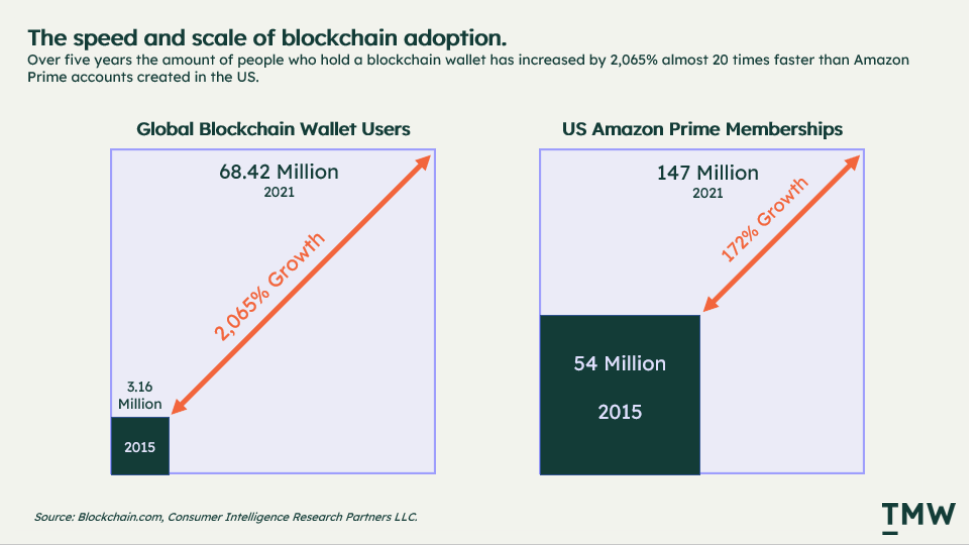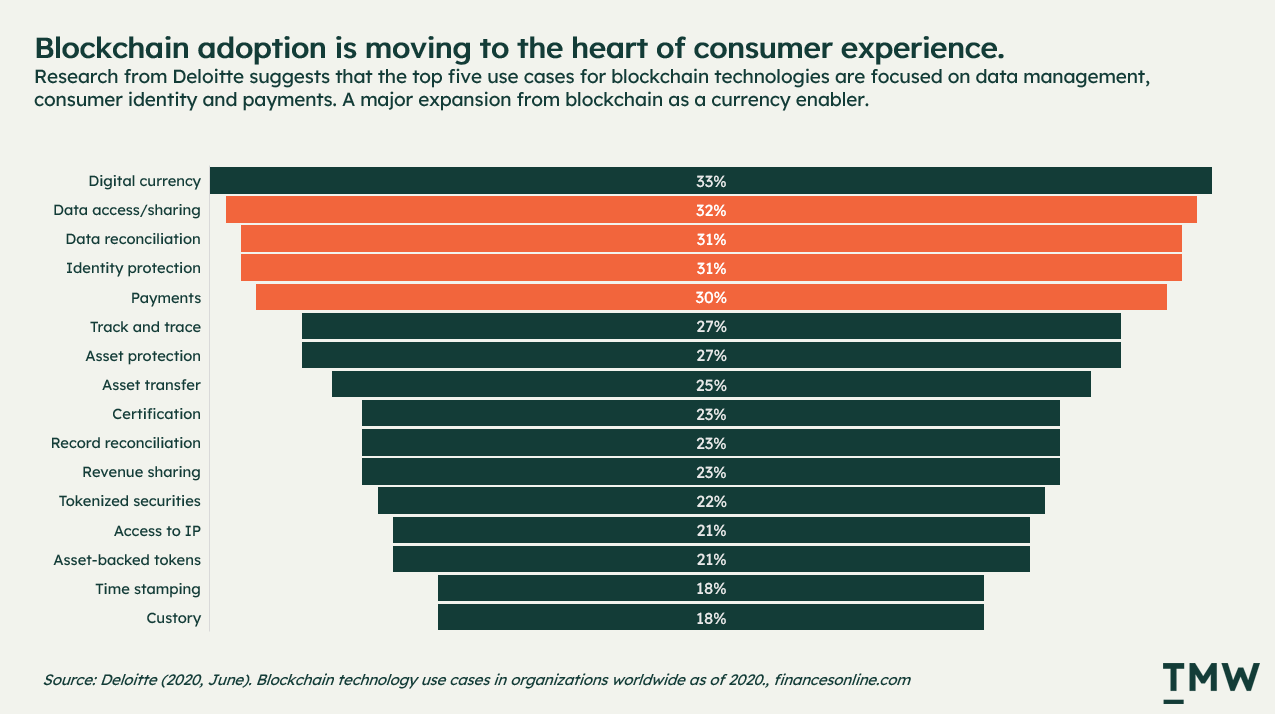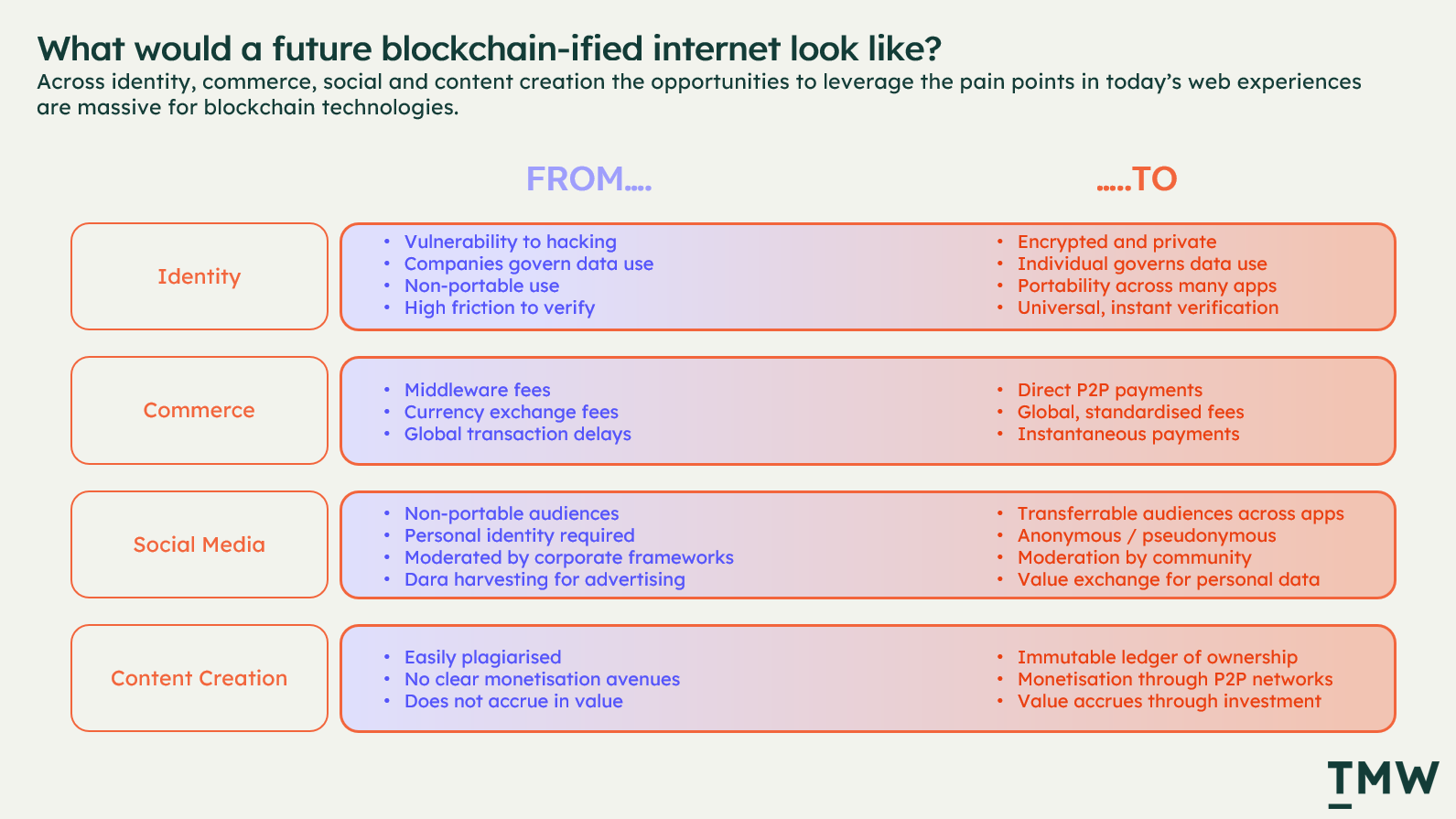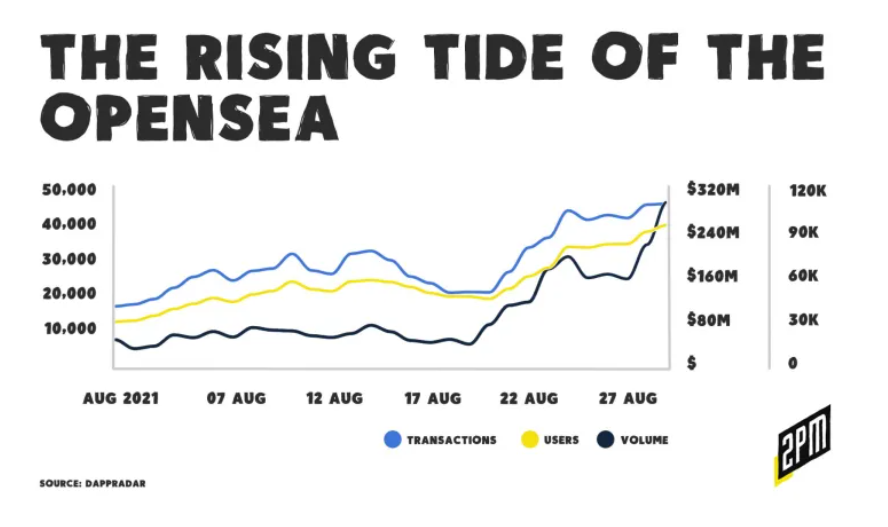TMW #054 | Digital identity and the blockchain, experience debt and the mind-blowing growth of OpenSea.
Welcome to The Martech Weekly, where every week I review some of the most interesting ideas, research, and latest news. I try to look to where the industry is going and make sense of it all.
👋 Why you should sign up
There are two versions of TMW, the full version for subscribers and a 50% version that's for everyone. You are reading the 50% version. Sign up to get the full version delivered every Sunday for this and every TMW. Learn more here.
👋 Hello and welcome to new subscribers from Poland, Australia, Serbia, India and The United States!
Welcome to TMW #054. It’s less than two weeks away until TMW’s first event. We’ll be discussing all things privacy, tracking, and targeting in advertising. To celebrate the first event I’m also giving away three tickets. I’ll announce three random winners next week! Go in the running here. Register here.
So, what happened this week in Martech?
- Digital identity and the blockchain. Adoption has grown more than 2000% since 2015 and is becoming a viable way to significantly change how customers manage their online identities.
- Experience debt: What is it and why is it important?
- The mind-blowing growth of OpenSea. This NFT company has seen significant revenue growth over just three months, that's a lot of jpegs.
- Everything else: Apple and the 30% app store tax, are north star metrics helpful? The 2021 mobile shopping apps report, a market map of the metaverse, and getting emails from your fridge.
✍ Commentary
Digital identity and the blockchain. A little while ago, I minted an NFT, and I can probably tell what you’re thinking, depending on where you are in the world and your age you probably think I did something interesting or stupid. Maybe it’s both. There’s a decade-old set of technologies that are now gaining momentum in the tech community, which has the potential to significantly augment how marketing, digital, and customer experience works online. It starts with how the customer’s identity will change as blockchain-powered apps promise to become more widespread, understood, and adopted.
Whatever your opinion of the blockchain or cryptocurrencies, you’d have to agree that over the past two years and during COVID-19 there’s been a significant rush of people investing in blockchain-enabled currencies and apps. A lot of what we’re seeing today in the world of NFTs, DAOs, and crypto exchanges is underpinned by the underlying cryptographic technology. Over the past five years, the number of people with a blockchain wallet has ballooned from a mere 3 million in 2015 to more than 68 million in 2021, that’s a 2,065% increase in users, roughly twice the population of Australia and 20 times the growth rate of Amazon Prime during the same five year period. That’s the kind of momentum you can’t ignore, even if the technology is still relatively opaque and too complicated for the average person most of the time.

So how do blockchain technologies have the potential to fundamentally change the marketing technology landscape? While many associate cryptocurrencies with the tech, it’s a far larger world than just Bitcoin, Etherium, and various other types of coins. In recent research, Deloitte surveyed the use cases for blockchain globally over 2020. Outside of digital currency use, the majority of cases revolve around data access, data reconciliation, payments, and identity protection. All four of these lie at the core of the fundamental value proposition of most marketing technologies.

When it comes to managing online identity, one of the fundamental issues at odds is most people don’t want to give up personally identifiable information online, yet are obliged to if they want to reap the rewards of the internet. To interact on a social network, or to buy something online, or to use software to do your job, there has to be an exchange of some form of personally identifiable information. And as we’ve seen time and time again, this information is more vulnerable to hacks and inappropriate use than we think.
For a long time, that exchange of data for access has been the bedrock for how we navigate the web, but that’s changing. The blockchain offers a wedge in that value proposition. What if a unique identifier can hold your government IDs, purchase history, logins, payment cards, and medical history in a way that’s private and portable? What if you could share your private information, or buy something from a brand in a way where the information handed over is encrypted and safe?
It’s from this cornerstone of digital identity where most other opportunities flow. Managing customer identity is vital for any owned or paid channel execution, like sending an email or SMS or targeting customers with ads on Google. All of these activities mostly rely on digital identity to work. The possibility that blockchain could enable better and more accurate data collection is a significant aspect of the tech. From analyzing churn behavior or predicting when a customer might buy again, to estimating revenue opportunities in an app experience, all of these rely on clean, accessible data. Every marketing technology is built on a foundation of data, and blockchain-enabled apps could direct how customers hand over their data in the future.

A lot of what we see today in the marketing technology landscape may be augmented by blockchain technologies. It’s not a stretch to one day send a segmented message to a cryptographic address, or to offer rewards to customers based on their purchase history when they use their wallet to login to an eCommerce store. The promise of the blockchain is bound up with anonymity and control; if you store the data collected on your interactions with brands, and then provision it when it creates value for you, then we might even see the death of the email address itself. This may be the future we’re staring down, and if the past five years has anything to show for it, we may see even more widespread adoption of blockchain technology to manage our online selves, and by consequence everything else. Links: Reclaiming your digital identity.The promise of managing identity on the blockchain. The blockchain and nation-states. Blockchain landscape.Wallet share, blockchain markets.
What is experience debt? Most of us are aware of technical debt, the snowball effect bad code and bad software accrues on any business over time, but is it possible that another kind of debt is impacting companies in how they realise long-term visions of success? An interesting piece this week from the Atlassian design blog talks about the ways in which they measure and act upon the past design and UX decisions. Just like bad code, bad experiences can compound over time, like incongruent interactions, formatting, and style or the path a customer takes to complete a task, it’s a huge job to manage and ensure that the entire experience is consistent and clear across a digital suite of products.
Much of the commentary around experience debt centers on the culture of shipping MVP versions of a product, mostly to gain iterative learnings and increase velocity, and this is where the concept of experience debt gets interesting. If you’re working in an agile team, shipping MVP is fairly best practice, but over time if you’re constantly shipping MVP there’s bound to be some major variations in the designs of those experiences and the patterns in which customers interact. Over time, debt accrues, and bringing uniformity to what customers are doing in your product becomes more of a challenge, kind of like death by paper cut. Link
📈Chart Of The Week
The mind-blowing growth of OpenSea. NFTs marketplaces are still inaccessible to most of the public. Setting up a wallet, buying tokens, paying gas fees are all complicated things to do. But the platform, OpenSea is an early indication of where the technology markets are going. The platform has been around for a while, but in the past three months, they have done $320M in transactions from 30k users. Apparently, there are alot of people in the world who want to spend their house deposit on a jpeg of an ape. 🤷♂️ Link

📰 Latest Developments
Apple to relinquish the 30% App tax. In a ruling this week, Apple will now be forced to allow developers to use third-party payment options in-app. This is a massive deal for any upstart app developer and a windfall for gaming apps like Epic which originally sued Apple on this issue. 98% of in-App purchases are happening on games, which means that consumer trust may take a hit, but will also benefit from lower prices. Link
AWS and content moderation. The company has announced sweeping new content moderation rules and is building out a new team to proactively remove violating content. This includes the cloud infrastructure, web hosting, and the hundreds of adjacent services AWS offers. Platform regulation is real. Link
Shopistry and headless commerce. An interesting partnership with Square and Sophistry could be a future indicator of how eCommerce platforms may setup their payments infrastructure in the future. Headless eCommerce is something that’s emerging and integrating Square’s payment infrastructure will enable even more flexibility in point of payment solutions. Link
📚 Reading
Privacy is contextual. The VP of data governance at the NYTs weighs in on the current privacy landscape. His thesis is focused on the need to reframe the thinking away from abiding by current regulations and rules to focusing on privacy as a sound business strategy for participation in the data economy. Link (BTW: In a couple of weeks we’ll be covering this topic in TMW’s first event: Here).
What can we learn from Web2? Increasingly, many in the tech community are seeing Web2 as a thing of the past. Things like ad-funded social networks, aggregators, and the harvesting of massive volumes of people’s data are all bundled into the problems Web2. Back in the 2000’s social was built into every other software offering and there was wild experimentation, and we’re in an era that reflects that time today, but there are just some things that don’t change in the internet economy. Link. Quitting Web2.
North star metric - is it helpful? Business leaders, product managers, CMOs, and many others often talk about defining their “north star.” It’s an analogy used to convey the brightest star in the sky, the problem is it’s surrounded by many other bright stars… making it hard to find, just like the one big metric everyone should be focused on. Link
🔢 Data & Insights
The 2021 mobile shopping apps report. App Annie in partnership with Liftoff and POQ has pulled data resources to analyze trends for in-app shopping over the past year. According to their data, time spent in shopping apps in 2020 grew to 45% of all shopping time, for Android users that’s two billion hours per week. Link
Are young people are concerned about online privacy? Yes, yes they are. Link
We’re still early to digital experiences. Research from Acquia suggests that almost 70% of customers surveyed want brands to make their interactions with them easier. Here’s the kicker though, only 10% of customers say they have good experience with brands, while 82% of marketers feel as though they are meeting consumer expectations. Link
💡 Ideas
Digital maturity index. Google and BCG have teamed up to create a digital maturity index survey, it’s a 30-minute questionnaire. They’ve called out six areas of maturity, like attribution capabilities, creating ads, audience segmentation, and access to analytics. Some of the questions are quite telling. Link
Pam. Marketplace aggregators are increasingly extending to the world of professional services and founders are finding profitable niches to meet the needs of underserved clients. One example is Pam, it’s a matching service for early-stage SaaS and product / UX agencies. Link
A market map of the Metaverse. Sure, many of us are making fun of the idea of a Metaverse, but the tech industry built around it is booming. Link
✨ Weird and Wonderful
Getting emails from your fridge with performance reports, personalised recommendations to improve temperatures, and how much water you’re drinking. Did we ever ask for this? Link
A world without PowerPoint. Link
Movies trailers are evolving. The Matrix trailer came out this week but as an in-browser experience. I chose the blue pill. Link
Stay Curious,
Make sense of marketing technology.
Sign up now to get the full version of TMW delivered to your inbox every Sunday afternoon plus an invite to the slack community.
Want to share something interesting or be featured in The Martech Weekly? Drop me a line at juan@themartechweekly.com.
